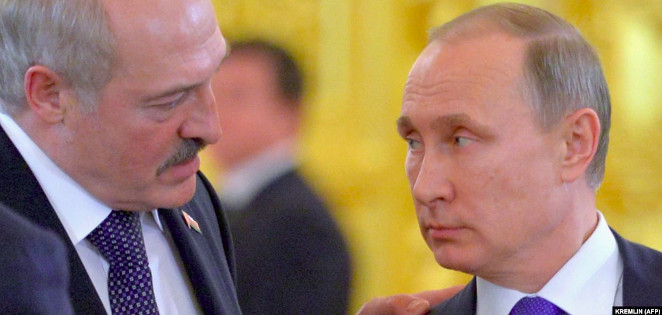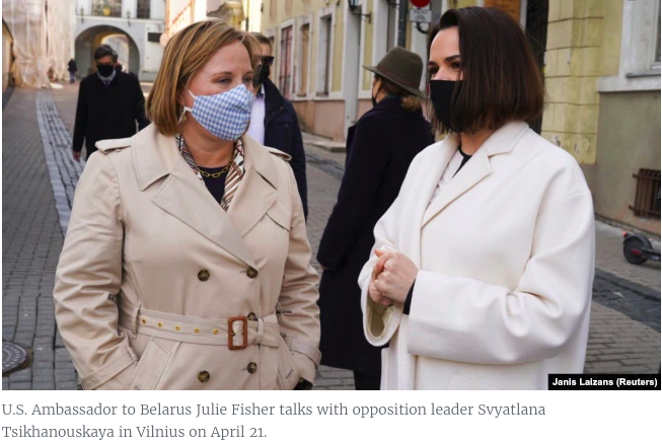In Moscow Talks, Putin And Lukashenka Praise Progress On Union State
By RFE/RL's Belarus Service with reporting by AP, Reuters, and TASS
26 April 2021, 13:00
 Belarusian strongman Alyaksandr Lukashenka has met in Moscow with Russian President Vladimir Putin, seeking Russia's continued support amid ongoing protests triggered by last year's widely disputed presidential election.
Belarusian strongman Alyaksandr Lukashenka has met in Moscow with Russian President Vladimir Putin, seeking Russia's continued support amid ongoing protests triggered by last year's widely disputed presidential election.
There were no major announcements following the April 22 talks, although both Putin and Lukashenka praised the progress being made toward unifying the two countries.
"Our teams are continuing to work to develop the legislation for the union state," Putin said during his talks with Lukashenka, referring to a bilateral agreement that envisions close political, economic, and security ties.
"We are actively moving forward in union programs," Lukashenka said.
Ahead of the meeting, Lukashenka stoked concerns that he could make concessions to the Russian leader in exchange for his continued support against the protests by saying he was on the verge of making one of the most important decisions of his 26 years in power.
Meeting the new U.S. ambassador to Belarus, Julie Fisher, in neighboring Lithuania on April 21, exiled Belarusian opposition leader Svyatlana Tsikhanouskaya said Belarus should retain its independence and sovereignty.
![In Moscow Talks, Putin And Lukashenka Praise Progress On Union State]()
“I want to see Belarus independent, free, and building friendly and mutually beneficial relations with all countries, first and foremost with our neighbors, but with other ones, too,” said Tsikhanouskaya, who left Belarus under pressure from the authorities shortly after the August vote.
The Moscow summit came in the wake of a purported plot to assassinate Lukashenka that allegedly involved a blockade of Minsk, power cuts, cyberattacks, and an assassination attempt against Lukashenka. Security forces in Moscow claimed to have arrested several alleged coup plotters in Moscow earlier this month.
Russia and Belarus must "draw lines that no one should cross and respond to those who fail to understand the need to behave more calmly," Lukashenka said in the Russian capital.
On April 21 in Vilnius, Lithuania, U.S. Ambassador Fisher said her meeting with Tsikhanouskaya “sends a clear signal that the U.S. stands with the Belarusian people.”
“As U.S. ambassador to Belarus, my priority is to embody that support,” said Fisher, who in December was appointed the first U.S. envoy to Belarus since 2008, but has yet to present her credentials in Minsk.
However, State Department spokesman Ned Price said later on April 21 that Fisher wouldn't take her position in the country under current conditions.
"Being able to return an ambassador to Minsk would send a powerful signal. But as long as what we have seen in Belarus continues, the human rights violations, the repression, there can be no business as usual," Price said.
Fisher said at her meeting with Tsikhanouskaya that "it is important that the international community speak up and speak out about what's happening, that we pay close attention, and that we call for the immediate release of all political prisoners in Belarus."
Since the August election, which Tsikhanouskaya’s supporters say she won, Belarus has seen unprecedented protests and political turmoil, with opposition groups claiming the vote was stolen by Lukashenka, who has run the country with an iron fist since 1994.
Security forces have arrested more than 34,000 people in a crackdown that has led to accusations of beatings and other rights abuses against demonstrators.
The West has refused to accept Lukashenka's victory, and few countries aside from Russia acknowledge him as president of Belarus.
Most prominent opposition leaders -- including Tsikhanouskaya -- have left the country.
The United States and the European Union have imposed sanctions against individuals and companies tied to Lukashenka's regime.
Earlier this week, Washington reimposed sanctions on nine state-owned companies, a move expected to deliver a crippling blow to Belarus's declining economy.
26 April 2021, 13:00

There were no major announcements following the talks, although both Russian President Vladimir Putin (right) and his Belarusian counterpart, Alyaksandr Lukashenka (left) praised the progress being made toward unifying the two countries. (file photo)
There were no major announcements following the April 22 talks, although both Putin and Lukashenka praised the progress being made toward unifying the two countries.
"Our teams are continuing to work to develop the legislation for the union state," Putin said during his talks with Lukashenka, referring to a bilateral agreement that envisions close political, economic, and security ties.
"We are actively moving forward in union programs," Lukashenka said.
Ahead of the meeting, Lukashenka stoked concerns that he could make concessions to the Russian leader in exchange for his continued support against the protests by saying he was on the verge of making one of the most important decisions of his 26 years in power.
Meeting the new U.S. ambassador to Belarus, Julie Fisher, in neighboring Lithuania on April 21, exiled Belarusian opposition leader Svyatlana Tsikhanouskaya said Belarus should retain its independence and sovereignty.

“I want to see Belarus independent, free, and building friendly and mutually beneficial relations with all countries, first and foremost with our neighbors, but with other ones, too,” said Tsikhanouskaya, who left Belarus under pressure from the authorities shortly after the August vote.
The Moscow summit came in the wake of a purported plot to assassinate Lukashenka that allegedly involved a blockade of Minsk, power cuts, cyberattacks, and an assassination attempt against Lukashenka. Security forces in Moscow claimed to have arrested several alleged coup plotters in Moscow earlier this month.
Russia and Belarus must "draw lines that no one should cross and respond to those who fail to understand the need to behave more calmly," Lukashenka said in the Russian capital.
On April 21 in Vilnius, Lithuania, U.S. Ambassador Fisher said her meeting with Tsikhanouskaya “sends a clear signal that the U.S. stands with the Belarusian people.”
“As U.S. ambassador to Belarus, my priority is to embody that support,” said Fisher, who in December was appointed the first U.S. envoy to Belarus since 2008, but has yet to present her credentials in Minsk.
However, State Department spokesman Ned Price said later on April 21 that Fisher wouldn't take her position in the country under current conditions.
"Being able to return an ambassador to Minsk would send a powerful signal. But as long as what we have seen in Belarus continues, the human rights violations, the repression, there can be no business as usual," Price said.
Fisher said at her meeting with Tsikhanouskaya that "it is important that the international community speak up and speak out about what's happening, that we pay close attention, and that we call for the immediate release of all political prisoners in Belarus."
Since the August election, which Tsikhanouskaya’s supporters say she won, Belarus has seen unprecedented protests and political turmoil, with opposition groups claiming the vote was stolen by Lukashenka, who has run the country with an iron fist since 1994.
Security forces have arrested more than 34,000 people in a crackdown that has led to accusations of beatings and other rights abuses against demonstrators.
The West has refused to accept Lukashenka's victory, and few countries aside from Russia acknowledge him as president of Belarus.
Most prominent opposition leaders -- including Tsikhanouskaya -- have left the country.
The United States and the European Union have imposed sanctions against individuals and companies tied to Lukashenka's regime.
Earlier this week, Washington reimposed sanctions on nine state-owned companies, a move expected to deliver a crippling blow to Belarus's declining economy.

